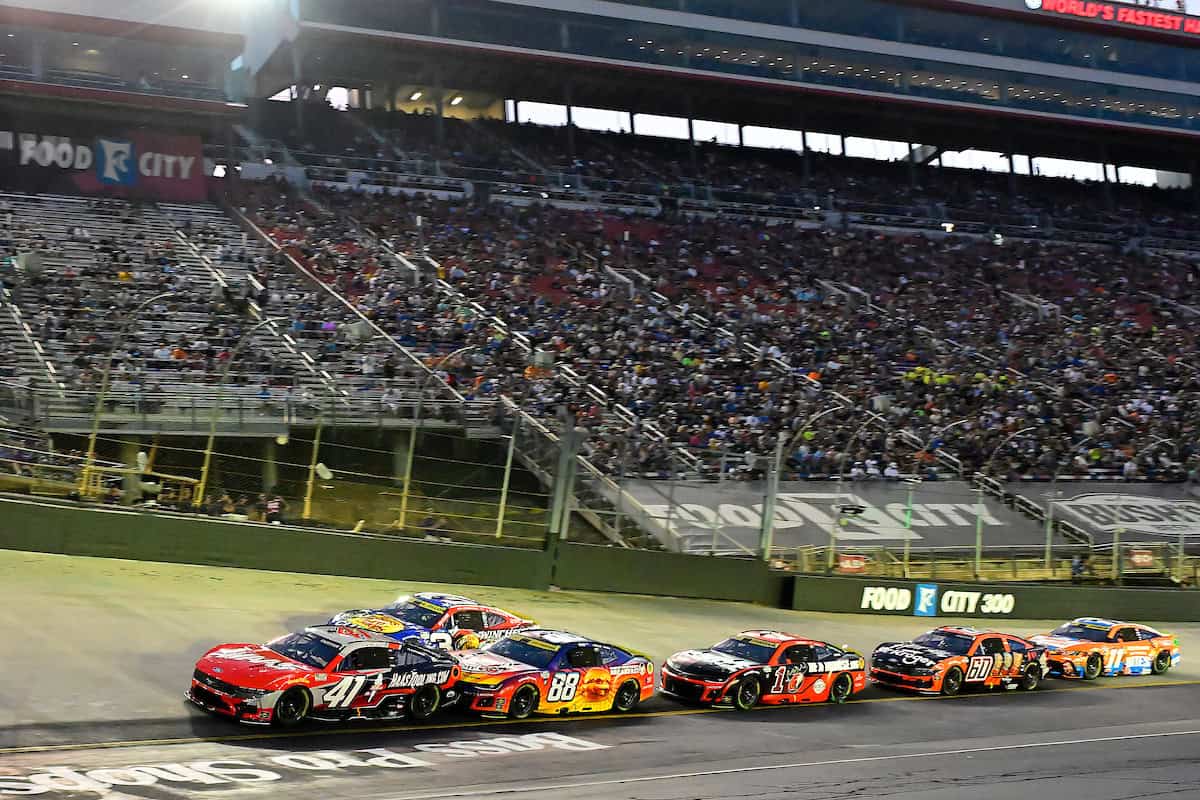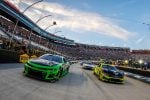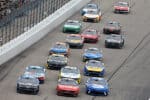With Saturday night (Sept. 13) turning into an attrition war of extreme tire wear, last weekend’s Bristol Night Race proved to be one for the NASCAR Cup Series record books. Multiple records were set or tied, and the box score was littered with intriguing fun facts and easter eggs.
Without further ado, let’s take a look at the 10 most notable numbers to come out of Saturday night’s showdown.
137: The Number of Laps Run Under Caution
Saturday night set the modern era record for most laps run under yellow, surpassing the 133 caution laps at Bristol in the spring of 1991. The all-time Cup record for caution laps in 172, set at Nashville Fairgrounds Speedway in 1961.
The laps under yellow took up nearly two hours of the race’s runtime of three hours and 48 minutes, and with 14 yellows, the average caution was an excruciating 9.8 laps. It’s worth noting that the 2003 Night Race featured 20 cautions but only 119 laps behind the pace car. The cautions were longer on Saturday night to help preserve the teams’ tires, but the average length of cautions has seen a dramatic increase overall.
69.686: The Average Speed (MPH) of the Race
The 2024 Bristol Night Race won by Kyle Larson had an average speed of 101.277 mph, breaking Charlie Glotzbach’s 53-year-old race record set in 1971. Larson’s win in the spring had an average speed of 100.746 mph, and it became just the fourth Bristol Cup race to eclipse the 100-mph average.
Saturday night was the polar opposite with an average speed of 69.686 mph. One year after the fastest Bristol Cup race of all time was the slowest Bristol Cup race since 1974. Even the 2024 spring race — the first tire wear marathon — put up an average speed just shy of 80 mph.
The slowest Bristol Cup race of all time was the July 1965 race won by Ned Jarrett with an average speed of 61.826 mph.
22: The Number of Consecutive Bristol Night Races that Have Ended at the Scheduled Distance
Since the implementation of overtime in the summer of 2004, more than 150 Cup races have ended beyond the scheduled distance.
The Bristol Night Race is not one of them, and of all the races on the Cup calendar since 2004, it is the only one that holds this distinction.
That streak nearly came to an end Saturday night, as the leaders lined up with a mismatch of tire wear for a four-lap dash to the finish. Everyone kept their cars straight, however, and the Bristol Night Race ended at lap 500 for the 22nd consecutive time in the overtime era.
In fact, it’s been more than a decade since a Bristol Cup race on pavement didn’t end in regulation. The last time a Bristol race ran beyond 500 laps was the 2015 spring race, which ended at 511.
36: The Number of Lead Changes on Saturday Night
Thirty-six lead changes is a number that looks downright puny in comparison to the absurd 54 lead changes set in the 2024 Bristol spring race (an all-time record for a short track race), but 36 is still good enough for the third-most lead changes at Bristol all time.
The aforementioned 1991 Bristol spring race with 133 caution laps holds the mark for second-most lead changes with 40, and that total was heavily inflated by NASCAR’s short-lived pit road rules at the start of the 1991 season that would confuse a rocket scientist.
726: The Number of Laps (Out of 1,000) That Joe Gibbs Racing Led Between the 2024 Bristol Spring & 2025 Bristol Night Races
It’s clear that Joe Gibbs Racing and its drivers have a leg up on the competition when faced with extreme tire wear in Thunder Valley.
The four JGR cars dominated the 2024 spring race by combining to lead 383 of the 500 laps. Denny Hamlin, who led the most laps at 163, held off Martin Truex Jr. to win to cap off a JGR 1-2 finish.
Saturday night was much of the same, with JGR cars combining to lead 343 laps. Ty Gibbs led all drivers with 201 laps out front, but it was JGR teammate Christopher Bell taking the lead and the win on the final restart with four to go.
831: The Number of Laps Ty Gibbs Has Led in Cup Series Competition Without a Win
Ty Gibbs is having the unluckiest road to a first win since Chase Elliott, who led more than 1,000 laps in Cup competition before finally scoring his maiden victory at Watkins Glen International.
With 201 laps led Saturday night, Gibbs is now up to 831 laps led in his Cup career. More than half of his laps led have come at Bristol, and he’s now led the second-most laps all time by a driver without a Cup win. Mike Skinner is the unfortunate record holder with 1,029 laps out front without a checkered flag.
8: The Number of Runner-Up Finishes Brad Keselowski Has Recorded Since Joining RFK Racing in 2022
Brad Keselowski ended his 110-race winless drought last season at Darlington Raceway, but his tenure has RFK has been defined by the near-misses.
Saturday night marked his eighth runner-up finish in the No. 6 car, and his attempted bump and run of Bell on the final lap only propelled the No. 20 car to the win.
In addition to eight runner-up finishes, Keselowski has also led 1,085 laps since 2022. More than 10% of his career laps led in Cup have come at RFK, and he only has a single points-paying win to show for it.
5: The Number of Drivers That Have Recorded Three Consecutive Last-Place Finishes in Cup Series Competition
Joey Logano became the first driver to sweep a playoff round back in 2015 by winning all three races in the Round of 12. Josh Berry, meanwhile, just accomplished the inverse with not one, not two, but three consecutive last-place finishes to open his first-ever Cup playoff appearance.
Berry, obviously, was one of the four drivers that failed to advance to the Round of 12 on Saturday night. It was a brutal stretch of races, but the good news for him is that it can’t get any worse.
Or can it?
In the 77-year history of Cup, only five drivers have recorded three consecutive last-place finishes: GC Spencer in 1960, Dave Blaney in 2009, Max Papis in 2010, Ryan Preece in 2020 and now Berry. No Cup driver has ever finished last four times in a row.
Berry now heads to New Hampshire Motor Speedway this Sunday (Sept. 21) looking to turn his playoffs around, all while trying to avoid making history for all the wrong reasons.
29.0: Denny Hamlin’s Average Finish in Races with King’s Hawaiian Sponsorship
By this point, any superstitious fan has noticed that Hamlin has had a tough race whenever King’s Hawaiian adorns the hood of his No. 11 car.
The sponsor’s debut came at Echo Park Speedway, and Hamlin finished 31st after getting swept up in a 23-car crash on lap 69. Its next appearance came in the regular season finale at Daytona International Speedway, and Hamlin finished 25th after multiple crashes.
Its latest appearance came at Bristol, and a race that Hamlin was hoping would be Cup win no. 60 quickly went off the rails with a car that wasn’t set up for extreme tire wear. To make matters worse, a right front wheel fell off the No. 11 car in the final stage that relegated Hamlin to five laps down in 31st by the checkered flag.
1985: The Last Time Prior to Saturday that No. 67 Scored a Top-10 Finish in the Cup Series
In NASCAR’s modern era, numbers above 50 are seldomly used. When 23XI added its part-time No. 67 car in 2023, it marked the first use of the number in Cup competition since 2002.
After starting second-to-last, Corey Heim worked his way up through the field Saturday night and got a timely caution at the end of the race that allowed him to pit and score a career-best sixth-place finish in his seventh Cup start. That marked the first top-10 for No. 67 since 1985, when the late Buddy Arrington finished 10th at Michigan International Speedway. The last time the number scored a finish better than sixth was at Talladega Superspeedway in 1979, where Arrington scored his career-best Cup finish of third.
Stephen Stumpf is the NASCAR Content Director for Frontstretch and is a three-year veteran of the site. His weekly column is “Stat Sheet,” and he formerly wrote "4 Burning Questions" for three years. He also writes commentaries, contributes to podcasts, edits articles and is frequently at the track for on-site coverage.
Find Stephen on Twitter @stephen_stumpf





